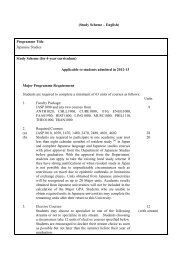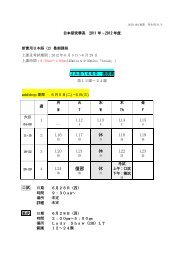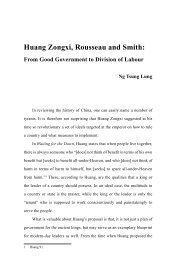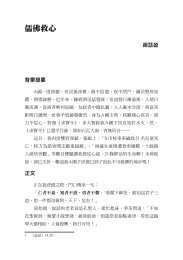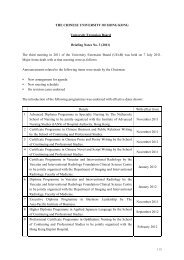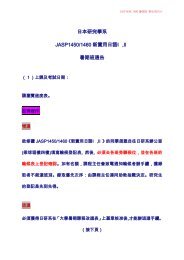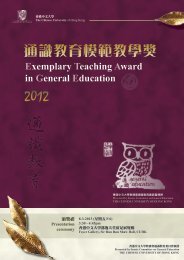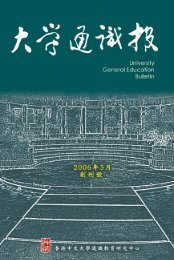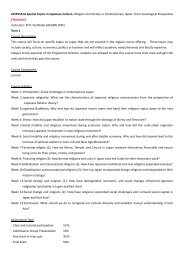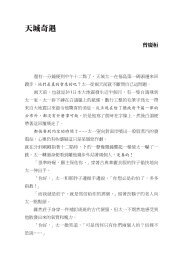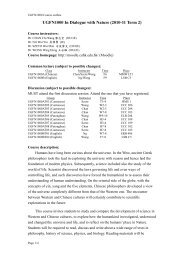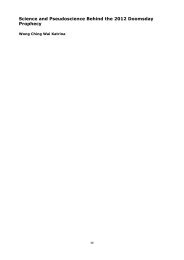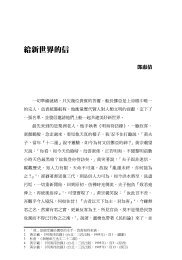- Page 3:
University General Education Bullet
- Page 9:
目 錄卷 首 語 ................
- Page 12 and 13:
彭 森 明 教 授 在 〈 以 學
- Page 14 and 15:
最 新 的 發 展 動 態 和 研
- Page 16 and 17:
2 Special Topic: Assessment in Univ
- Page 18 and 19:
4 Special Topic: Assessment in Univ
- Page 20 and 21:
6 Special Topic: Assessment in Univ
- Page 22 and 23:
8 Special Topic: Assessment in Univ
- Page 24 and 25:
10 Special Topic: Assessment in Uni
- Page 26 and 27:
12 Special Topic: Assessment in Uni
- Page 28 and 29:
14 Special Topic: Assessment in Uni
- Page 30 and 31:
16 Special Topic: Assessment in Uni
- Page 32 and 33:
18 Special Topic: Assessment in Uni
- Page 34 and 35:
20 Special Topic: Assessment in Uni
- Page 36 and 37:
22 Special Topic: Assessment in Uni
- Page 38 and 39:
24 Special Topic: Assessment in Uni
- Page 40 and 41:
26 Special Topic: Assessment in Uni
- Page 42 and 43:
28 Special Topic: Assessment in Uni
- Page 44 and 45:
30 Special Topic: Assessment in Uni
- Page 46 and 47:
32 Special Topic: Assessment in Uni
- Page 48 and 49:
34 Special Topic: Assessment in Uni
- Page 50 and 51:
36 Special Topic: Assessment in Uni
- Page 52 and 53:
38 Special Topic: Assessment in Uni
- Page 54 and 55:
40 Special Topic: Assessment in Uni
- Page 56 and 57:
42 Special Topic: Assessment in Uni
- Page 59 and 60:
以 學 習 成 果 為 主 軸 的
- Page 61 and 62:
彭 森 明 : 以 學 習 成 果
- Page 63 and 64: 彭 森 明 : 以 學 習 成 果
- Page 65 and 66: 彭 森 明 : 以 學 習 成 果
- Page 67 and 68: 彭 森 明 : 以 學 習 成 果
- Page 69 and 70: 彭 森 明 : 以 學 習 成 果
- Page 71 and 72: 彭 森 明 : 以 學 習 成 果
- Page 73 and 74: 彭 森 明 : 以 學 習 成 果
- Page 75 and 76: 彭 森 明 : 以 學 習 成 果
- Page 77 and 78: 彭 森 明 : 以 學 習 成 果
- Page 79 and 80: 彭 森 明 : 以 學 習 成 果
- Page 81 and 82: 彭 森 明 : 以 學 習 成 果
- Page 83 and 84: 評 核 大 學 生 在 通 識 教
- Page 85 and 86: 徐 慧 璇 : 評 核 大 學 生
- Page 87 and 88: 徐 慧 璇 : 評 核 大 學 生
- Page 89 and 90: 徐 慧 璇 : 評 核 大 學 生
- Page 91 and 92: 徐 慧 璇 : 評 核 大 學 生
- Page 93 and 94: 徐 慧 璇 : 評 核 大 學 生
- Page 95 and 96: 徐 慧 璇 : 評 核 大 學 生
- Page 97 and 98: 徐 慧 璇 : 評 核 大 學 生
- Page 99 and 100: 徐 慧 璇 : 評 核 大 學 生
- Page 101 and 102: 徐 慧 璇 : 評 核 大 學 生
- Page 103 and 104: 徐 慧 璇 : 評 核 大 學 生
- Page 105 and 106: 徐 慧 璇 : 評 核 大 學 生
- Page 107 and 108: 徐 慧 璇 : 評 核 大 學 生
- Page 109 and 110: 徐 慧 璇 : 評 核 大 學 生
- Page 111 and 112: 徐 慧 璇 : 評 核 大 學 生
- Page 113: Why Not Try a Scientific Approach t
- Page 117 and 118: Carl Wieman, Why Not Try a Scientif
- Page 119 and 120: Carl Wieman, Why Not Try a Scientif
- Page 121 and 122: Carl Wieman, Why Not Try a Scientif
- Page 123 and 124: Carl Wieman, Why Not Try a Scientif
- Page 125 and 126: Carl Wieman, Why Not Try a Scientif
- Page 127 and 128: Carl Wieman, Why Not Try a Scientif
- Page 129 and 130: Carl Wieman, Why Not Try a Scientif
- Page 131 and 132: Carl Wieman, Why Not Try a Scientif
- Page 133 and 134: Carl Wieman, Why Not Try a Scientif
- Page 135: Carl Wieman, Why Not Try a Scientif
- Page 138 and 139: 124 Teaching and Learning in Genera
- Page 140 and 141: 126 Teaching and Learning in Genera
- Page 142 and 143: 128 Teaching and Learning in Genera
- Page 144 and 145: 130 Teaching and Learning in Genera
- Page 146 and 147: 132 通 識 教 與 學力 等 方
- Page 148 and 149: 134 通 識 教 與 學( 三 ) 在
- Page 150 and 151: 136 通 識 教 與 學己 的 家
- Page 152 and 153: 138 通 識 教 與 學慧 , 推
- Page 154 and 155: 140 通 識 教 與 學承 聯 合
- Page 156 and 157: 142 通 識 教 與 學而 「 兩
- Page 158 and 159: 144 通 識 教 與 學( 一 ) 萬
- Page 160 and 161: 146 通 識 教 與 學這 兩 體
- Page 162 and 163: 148 通 識 教 與 學第 三 定
- Page 164 and 165:
150 通 識 教 與 學根 據 愛
- Page 166 and 167:
152 通 識 教 與 學b. 收 斂
- Page 168 and 169:
154 通 識 教 與 學( 二 ) 攝
- Page 170 and 171:
156 通 識 教 與 學( 一 ) 蝴
- Page 172 and 173:
158 通 識 教 與 學性 的 共
- Page 174 and 175:
160 通 識 教 與 學木 星 質
- Page 176 and 177:
162 通 識 教 與 學L 460ºSPL 3
- Page 178 and 179:
164 通 識 教 與 學( 二 ) 最
- Page 180 and 181:
166 通 識 教 與 學蒸 發 ,
- Page 182 and 183:
168 通 識 教 與 學雙 曲 線
- Page 184 and 185:
170 通 識 教 與 學參 考 書
- Page 186 and 187:
172 通 識 教 與 學17. Wikipedi
- Page 189 and 190:
文 化 、 大 學 文 化 與 通
- Page 191 and 192:
陸 根 書 : 文 化 、 大 學
- Page 193 and 194:
陸 根 書 : 文 化 、 大 學
- Page 195 and 196:
陸 根 書 : 文 化 、 大 學
- Page 197 and 198:
陸 根 書 : 文 化 、 大 學
- Page 199 and 200:
陸 根 書 : 文 化 、 大 學
- Page 201 and 202:
陸 根 書 : 文 化 、 大 學
- Page 203 and 204:
陸 根 書 : 文 化 、 大 學
- Page 205 and 206:
陸 根 書 : 文 化 、 大 學
- Page 207 and 208:
陸 根 書 : 文 化 、 大 學
- Page 209 and 210:
陸 根 書 : 文 化 、 大 學
- Page 211 and 212:
陸 根 書 : 文 化 、 大 學
- Page 213 and 214:
陸 根 書 : 文 化 、 大 學
- Page 215 and 216:
陸 根 書 : 文 化 、 大 學
- Page 217:
陸 根 書 : 文 化 、 大 學
- Page 220 and 221:
206 論 壇實 處 。 1 十 幾
- Page 222 and 223:
208 論 壇那 麼 , 事 實 與
- Page 224 and 225:
210 論 壇主 義 和 人 文 主
- Page 226 and 227:
212 論 壇高 校 引 進 精 品
- Page 228 and 229:
214 論 壇的 數 量 維 持 在
- Page 230 and 231:
216 論 壇向 , 學 生 的 興
- Page 232 and 233:
218 論 壇大 堆 泛 泛 的 「
- Page 234 and 235:
220 論 壇9. 殷 小 平 (2007)。
- Page 236 and 237:
222 論 壇專 業 的 入 門 課
- Page 238 and 239:
224 論 壇程 》 一 書 中 極
- Page 240 and 241:
226 論 壇度 作 構 圖 。 他
- Page 242 and 243:
228 論 壇改 為 寺 廟 為 主
- Page 244 and 245:
230 論 壇名 氣 有 多 大 ,
- Page 246 and 247:
232 論 壇詩 的 優 劣 則 使
- Page 248 and 249:
234 論 壇他 們 運 用 自 如
- Page 250 and 251:
236 論 壇七 十 年 代 , 美
- Page 252 and 253:
238 論 壇8. Torff, B. & Sternberg



